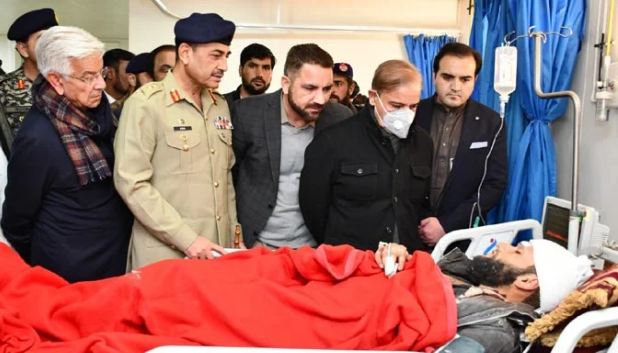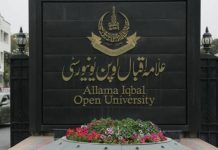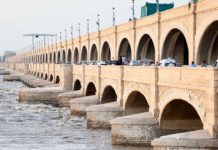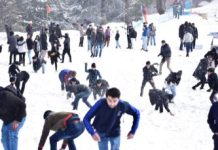Following the suicide attack in Peshawar, Prime Minister Shehbaz Sharif said he would ensure that “the National Action Plan (NAP) is implemented in full force” and with complete comprehensiveness.
PM Sharif visited the Lady Reading Hospital (LRH) Monday evening to inquire about the injured in the deadly blast that took place at the mosque of Malik Saad Shaheed Police Lines during Zuhr prayers which also claimed at least 59 lives.
The premier was received by Army Chief General Asim Munir and then took rounds of different wards and met the injured.
PM Shehbaz directed the hospital administration to provide the best medical facilities to all the injured.
He was accompanied by Minister for Defence Khwaja Muhammad Asif, Interior Minister Rana Sanaullah Khan and Minister for Information and Broadcasting Marriyum Aurangzeb.
A representative of the Lady Reading Hospital, where 157 injured people were brought after the attack, said the death toll in the explosion has reached 59.
In Peshawar, the Corps Commander Peshawar briefed the PM on the factors and motivations behind the rise in terrorism in Peshawar.
The premier was shown the CCTV footage of the suicide attack, and the IG Police also presented the preliminary investigation report on it.
“Terrorists are making a sinister attempt to create fear and terror by attacking defence agencies,” the premier said, adding, “They will be defeated by the strength of the unity of the state and the people.”
Mentioning the great loss of life of security personnel and civilians due to terrorism, he said that Pakistan had made great sacrifices against terrorism and that he would not “let the sacrifices of the martyrs go in vain.”
The premier also stressed that he would ensure thorough implementation of the NAP to cut the roots of terrorism in the country.
After the Army Public School attack on 16th of December 2014, a national consensus was evolved to come down hard on the terrorists through a concerted effort. A 20 Points National Action Plan (NAP) for countering terrorism and extremism was chalked out by NACTA/Ministry of Interior in consultation with the stakeholders and approved on 24th of December, 2014 by the parliament.
Measures taken in NAP included the implementation of death sentence of those convicted in cases of terrorism; establishment of special trial courts under the supervision of army; banning militant outfits and armed gangs; strengthening National Counter-Terrorism Authority (NACTA); and strict action against promotion of hatred, extremism, sectarianism and intolerance.
Expressing his sorrow at the heinous attack, PM Shehbaz said: “Those who shed the blood of prostrate worshipers in the house of Allah cannot be Muslims. The perpetrators of this crime will not be able to escape from the grip of Allah. We will erase these criminals from the pages of history.”
He also said that he would increase the capacity and capability of the anti-terrorism agencies and the police.
He added said that attacking mosques and innocent citizens during prayers in the name of Islam was the worst of acts and that the people of Pakistan have recognised the true faces of the elements who misinterpret religion.
“Such cowardly attacks cannot weaken our national resolve against terrorism,” he said, adding, “Evil elements and their facilitators will be brought to justice.”
Taking to Twitter, he said: “While the pain of the grieving families cannot be described in words, I express my heartfelt condolences & most sincere sympathies. My message to the perpetrators of today’s despicable incident is that you can’t underestimate the resolve of our people.”
Resolutions to root out terror
On December 30, a meeting of the National Security Committee (NSC) was headed by PM Shehbaz, which decided to turn up the heat on the militancy with relentless counter and preemptory measures to neutralise the threats present in the country in any form.
Participants of the NSC meeting unequivocally resolved that Pakistan’s national interests would not be compromised and no one would be allowed to undermine national security.
The meeting was attended by services chiefs, intelligence heads, and federal ministers.
Rising terror attacks
For the past few months, Pakistan has witnessed a fresh wave of terrorism with the most recent spate of terror attacks carried out in Balochistan and Khyber Pakhtunkhwa.
Pakistan Army’s top brass said it had resolved to uproot terrorism “without any distinction” as the country battles a fresh wave of insurgency, which has left many soldiers martyred and several others injured.
Pakistan is facing rising terror attacks — especially by the outlawed Tehreek-e-Taliban Pakistan (TTP) and from across the Afghan border after it ended a ceasefire with the government last year.
According to reports, the TTP regrouped in Afghanistan after the Taliban’s takeover, with Pakistan repeatedly asking the interim government in the neighbouring country to ensure that its soil isn’t used for terrorism. But the Taliban-led government has not been able to live up to the expectations.
The activities of militants have been mainly focused in Balochistan and Khyber Pakhtunkhwa, with the former accounting for 31% of the attacks during the last year and the latter 67%, according to statistics provided by Interior Minister Rana Sanaullah.












